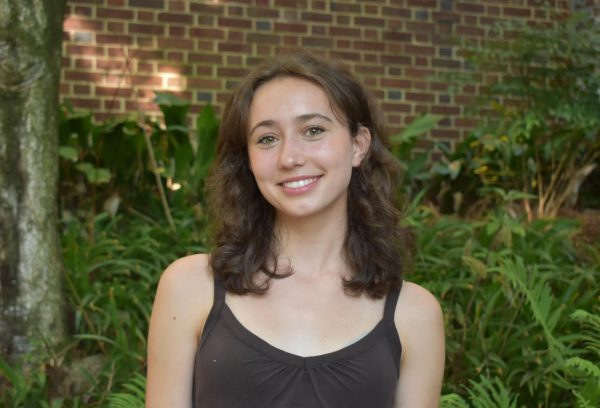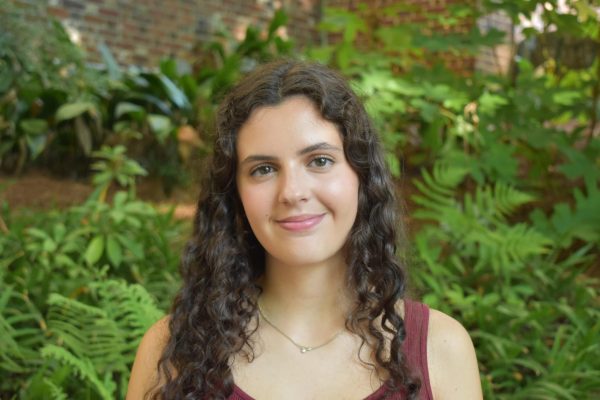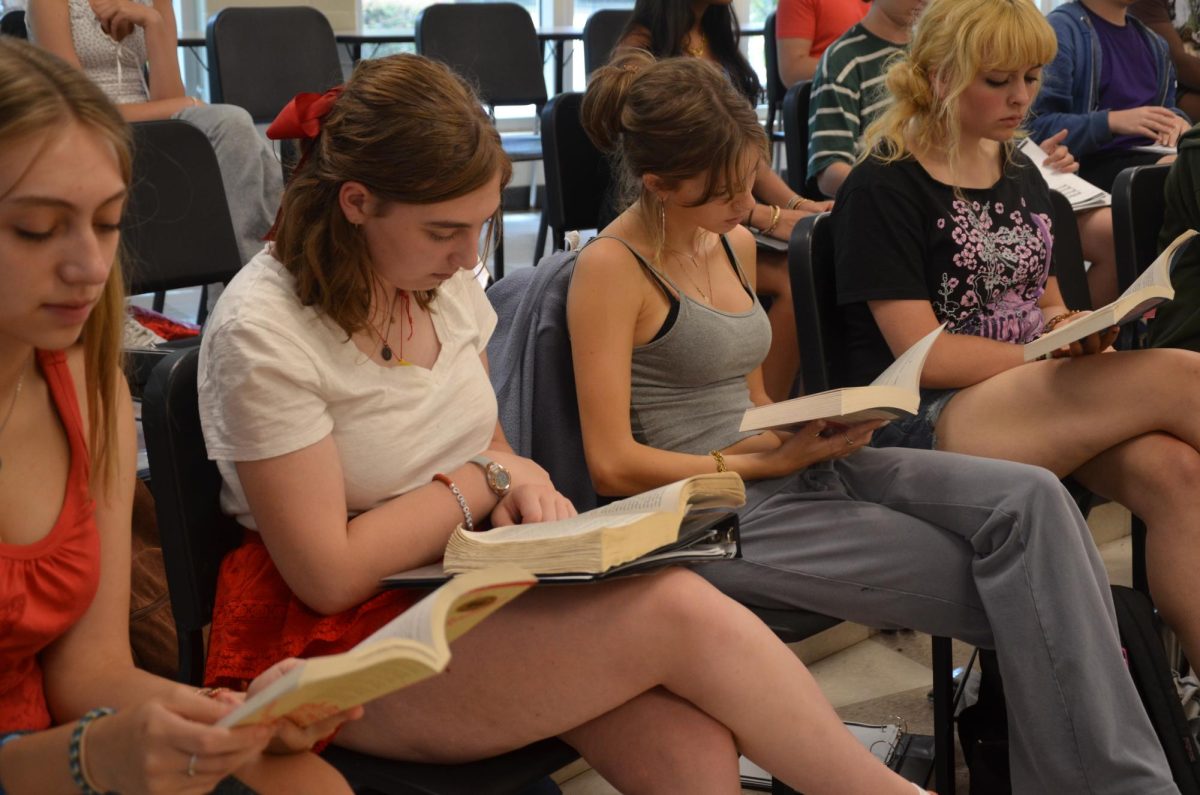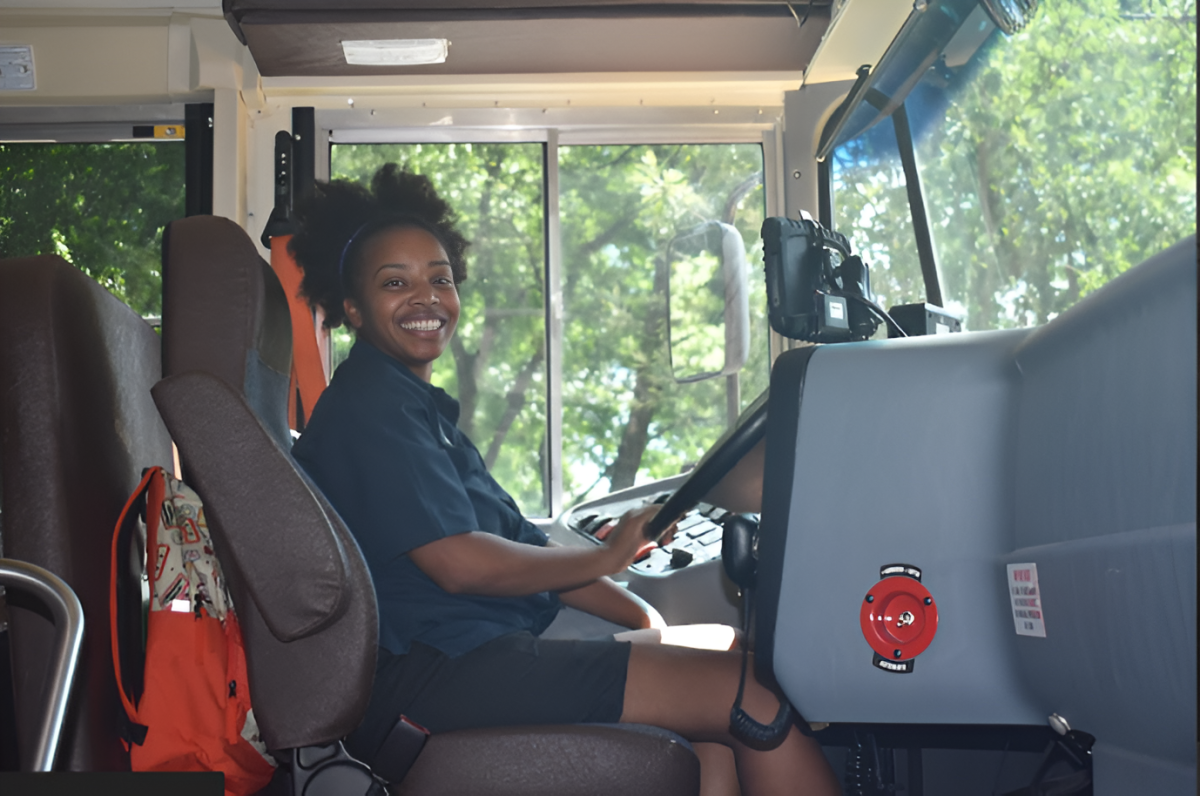
School community navigates first month of new phone policy
In an effort to reduce distractions in school, Midtown has implemented a Yondr pouch system, where all students are required to place their phones and other small personal electronic devices (PEDs), including smartwatches, in pouches that are locked throughout the day.
Graduation coach Susanna Roberts serves as one of two line monitors in the morning as students enter school and as a support person throughout the day.
“This is a big change for a lot of people,” Roberts said. “There is a learning curve with every large change, but I think we had our learning curve really, really fast.”
The quick adaptation to the new policy has led to noticeable improvements in classroom management. Staff are reporting a reduction in the time spent addressing distractions caused by electronic devices.
“Faculty members are pleased they are having to spend much less instructional time on correcting and redirecting students using electronic devices in the classroom,” Principal Betsy Bockman said.
This early success in classroom management is further reflected in the recent progress reports, which indicate a decrease in the number of students failing multiple classes.
“Looking at all 4.5 week progress reports it appears that we have fewer students failing multiple classes at this point than what is expected,” Dr. Betsy Bockman said.
Midtown administrators made clear the disciplinary consequences for collection of PEDs during the school day.
“I was initially on the fence when the policy came out,” Dr. Craig Ogden, math teacher, said. “I thought students would break into the pouches and rip them open. But, I have found it incredibly efficient because of both how the system has been implemented and how the consequences have been communicated to all stakeholders.”
“It’s just not worth it,” senior Melina Welch said. “Of course, I am not a fan of having my phone taken away. But at the same time, I don’t want to get detention or be suspended on my record.”
With any infraction, the device is taken and stored in the front office, and the parent/guardian of the student has to pick it up from 8:45 a.m.-4:00 p.m on the same day of infraction.
“The fact that the phone is not handed back to you, but instead to your parents, is the real consequence,” Dr. Ogden said. “A parent has to take the time out of their day or work, and that starts the conversation at home about following the policy.”
All infractionary measures are logged and handled by a team of staff and administrators throughout the day. If a teacher notices a PED, they notify the designated support person (DSP) without interrupting class or talking to the student about the device.
“Nobody’s job has specifically changed to be focused on cell phones, but there’s a lot of us, including all of the administrators and several of the non-instructional staff, who have incorporated part of this into their daily tasks,” Roberts said. “Part of my job as a graduation coach is to do whatever I can to help students be more successful at school. This falls in that category because this cell phone policy is going to help kids stay on track more, have fewer late assignments, hopefully have fewer failing grades and really keep kids on track for graduation.”
Social studies teacher Kelly Wren believes this keeps the burden off teachers to enforce.
“It’s harder for us to [enforce] because we have so many other things we’re trying to accomplish inside of a classroom,” Wren said. “If we were in charge, it would have been probably less successful as a policy overall, but taking us out of it and dedicating a team of professionals that can support us in making this policy work shows it honestly has been very thoughtfully created.”
As a DSP, Roberts is working to refine the protocol throughout the semester to continue to alleviate pressure from teachers.
“We have 1,700 kids and 170 staff members,” Roberts said. “We’re constantly working to refine the communication and logistics. We’re working through this every single day and getting better.”
Students with medical accommodations have been handled on a case-to-case basis. Senior Sadie Irwin has Type 1 Diabetes and uses her phone as a medical device. The school authorized her to receive a “medical pouch” that had a Velcro closure rather than the normal magnetic lock closure.
“Continuous glucose monitors allow diabetics to have constant blood sugar readings and alerts if their blood sugar is too high or too low,” Irwin said. “If I was unable to receive alerts and readings, my school day would be extremely stressful and dangerous.”
Irwin said the administrative accommodation was well done and created a smooth transition.
“A week or two before school began, I was informed that I would receive a medical pouch,” Irwin said. “I feel very supported by all of the administrators that have been involved in the whole Yondr pouch situation and all of my teachers have been understanding of my accommodations. This is likely because my teachers were informed of my accommodations prior to school beginning.”
The goal of the PED policy on the Midtown website is “resetting and restoring a learning environment that was eroded by COVID and our increased attachment to virtual spaces.”
Wren said she has experienced a notable shift in and outside of her classroom since the school year started.
“This policy is not just getting rid of the distraction,” Wren said. “It encourages more in-class conversation, people getting to know peers and reading books. It feels like when I was in high school, when this technology did not yet exist. In the courtyard, students are conversing with each other and engaging in conversation, and they’re doing things that you didn’t see as much before.”
Math teacher Carrie Rowe used a pocket system in her classroom the past two years and believes the Yondr pouches are more efficient.
“I used to spend the first and last five to 10 minutes of class trying to get [students] to put their phones up [in the pockets],” Rowe said. “Now, we pack up two minutes early or one minute early, so it saves time.”
Rowe believes the breadth of the policy to include computers and headphones, as well, further minimizes distraction.
“The headphones were a large issue for me,” Rowe said. “People would have them on and couldn’t hear me at all. Additionally, everyone will have their laptops ready and charged for tests, which I love. We have lost so many distractions. There is nothing else to do but work now.”
Dr. Ogden has seen an impact in the first few weeks of the year in his classroom, but said he has needed to alter some ways he conducts his lessons.
“I have very much so enjoyed seeing the impact that [the policy] has had,” Dr. Ogden said. “Students are more attentive and engaged. Normally, I do move pretty fast in my lectures though, and sometimes, I ask students to just take a photo of the board if there is something they were not able to write down. So, I am adjusting my teaching style a bit.”
AP Research students conducted surveys and evaluated several aspects of the policy’s impact. Sophomore Jacob Wooten investigated the perceived change in student productivity.
“We found that people did not perceive any change, and most of the responses were skewed toward negative change,” Wooten said. “I feel like personally it is too early to tell, but I did not expect this data. I thought it would skew much greater to a positive change.”
Without phones, many students are picking up other activities to take up non-instructional moments during the school day.
“We have had an unprecedented amount of books checked out already,” Brian Montero, library specialist, said. “This year already we’ve probably checked out twice as many books as the start of last year. Reading can increase your critical thinking skills, ability for empathy and, of course, literacy.
Senior Livia Bolster has spent more time in the library and reading in school.
“I would not describe myself as a reader,” Bolster said. “But, I have already [in the first week] finished my first book. It feels nicer to do in class than scrolling on my phone, and it makes me feel a little more focused.”
Additionally, the library has placed out a number of games for students, including cards, chess, and checkers, to play in the media center and check out.
“We’ve realized that people need alternatives to being on the screen all day,” Montero said. “The response to the chess board has been especially notable. I think it is just one thing where people are now thinking more as a participant of society rather than in their individual [lives] on phones.”
With a small magnetic lock and thick mesh bag, Yondr pouches can be damaged in several ways. If the pouch issued is lost or damaged, the student will need to purchase a new pouch for $30 or leave all personal devices at home.
Dr. Ogden has seen multiple students attempt to access their phones in his class.
“Some students have just been destructive,” Ogden said. “They are literally taking the bags and finding some hard metal or brick wall to smash the bag on. I see it happening on my desks. I have caught students trying to use my scissors to maneuver around the lock. It seems some will try to break it by any means necessary.”
Every morning, Roberts and other DSPs take any damaged pouches they see at the entrance of school. From there, they take all collected damaged pouches through a double-check and notify parents of students with damaged pouches.
“I’m hoping students start getting the message that damaging a pouch is not the way to do this,” Roberts said. “We really have not had a whole lot of kickback on it from students. I would estimate 85% of the student population is doing exactly what we have asked, and we greatly appreciate it.”
Junior Lizzie Lyman believes that the Yondr pouches’ efficiency is due to the infractionary policy rather than the physical deterrent of the pouch.
“While I agree that phones are a major issue at Midtown, I don’t think Yondr pouches were the right decision,” Lyman said. “I think by enforcing the same strict rules that came with the pouches (the confiscation and the four-level infraction system) as a stand-alone policy, we could solve the issue. Many people have already proved they have no problem opening the pouches, so it’s not a physical barrier stopping people from using their phones; it’s the threat of punishment.”
Additionally, the elimination of phones has raised concerns about communication and emergency protocol.
For non-emergency communication, Midtown has expanded Schoology, the school’s learning platform, to accommodate messaging between parents and students and between students.
Junior Hadya Khpulwak does not believe Schoology messaging has been a complete supplement to having a phone.
“A lot of students worry that while they are communicating on Schoology, they are being watched,” Khpulwak said. “Personally, I think that it is unfair because I have always taken my lunch time to call my siblings and parents. That is our free time to enjoy how we want.”
For emergencies, pouches will be unlocked in an evacuation scenario once it’s established that students are safely away from any danger.
“I think many students worry about an emergency situation,” Khpulwak said. “I am not that worried currently, but we have not been in an emergency situation, so I do not know.”
Without access to phones and personal computers, the importance of school Chromebooks has been heightened as students do not have access to alternative Hotspots or devices.
Montero has been focused on this issue since the start of school and believes it needs the school’s attention. In the first two weeks of school, a large number of devices were having problems connecting to the school’s Wi-Fi and allowing students to log in.
“Now [that students] don’t have devices, we need to make sure they can get Chromebooks,” Montero said. “We are working on a fix for the large number of computers in the backlog, but once those are distributed, that should alleviate some of the anxiety. It is important to be able to communicate with the parents and things like that throughout the school day.”
The school allocated $50,000 to this year’s budget to pay for the Yondr pouch system.
Lyman believes the money could have been better spent in other technology sectors.
“My main issue with the plan is that it cost [$50,000] of Midtown‘s money that could’ve been spent on something to actually improve student life at the school,” Lyman said. “This change is something that could’ve been done without the pouches and those [$50,000] could’ve been added as something supplementary like improved computers or Wi-Fi to help the policy work.”
Despite this, Lyman believes the overall issue is pressing and understands the administrative focus with this policy.
“Honestly, being angry about not using Snapchat or TikTok during school or not being able to use my iPad for work seems really silly when you step back and look at the bigger issues surrounding mental health,” Lyman said. “My parents were right; [the problem] really is the phones.”















